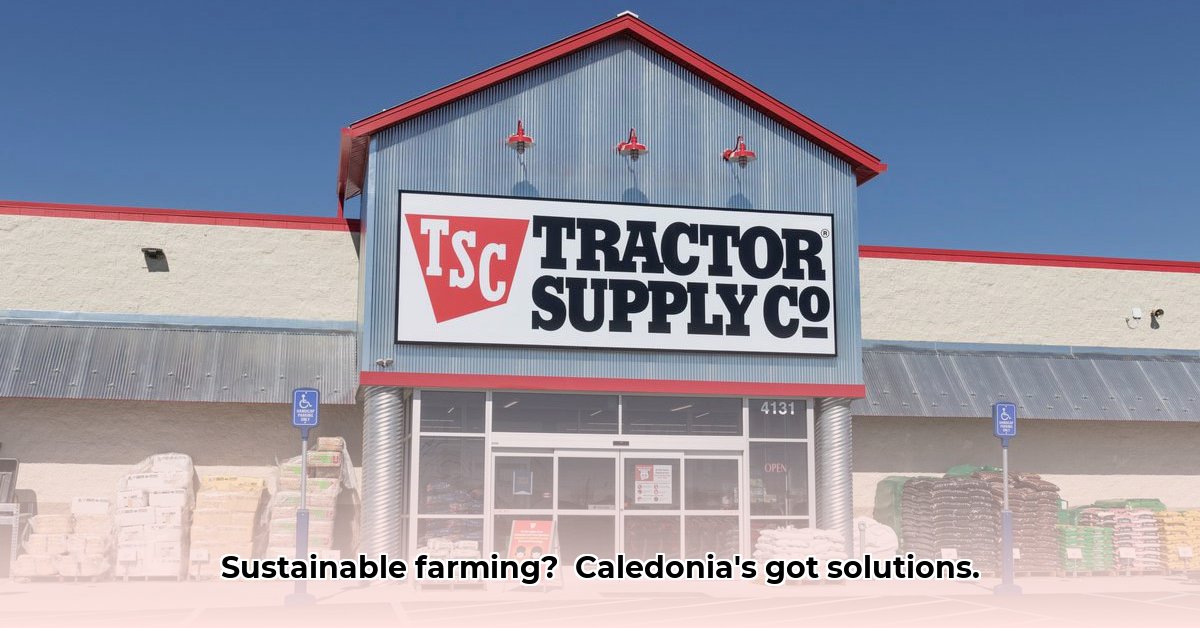
Caledonia Tractor Supply plays a crucial role in the local farming community, but its potential contribution to sustainable agriculture remains largely untapped. This article analyzes its current impact, identifies opportunities for improvement, and provides actionable recommendations for all stakeholders. By embracing sustainable practices, we can ensure a healthier and more prosperous future for Caledonia's agricultural sector. For more information on pasture seeds, check out this helpful resource: Pasture Seed Guide.
Product Offerings: Supporting Sustainable Farming
Caledonia Tractor Supply offers a range of products relevant to sustainable agriculture. Directly sustainable options include organic seeds and tools designed for efficient land and water management (e.g., drip irrigation systems). Indirectly, many other products – fertilizers, livestock feed, etc. – can contribute to sustainable practices when used responsibly. The store provides the tools; the onus is on farmers and consumers to utilize them sustainably. The convenience of a local supplier also reduces transportation emissions, indirectly contributing to environmental sustainability.
Caledonia Tractor Supply's Current Impact: A Baseline Assessment
While Tractor Supply offers considerable potential, a lack of explicit sustainability certifications currently limits the precise measurement of its direct impact on sustainable farming. This absence doesn't negate the potential; rather, it highlights the need for proactive steps to enhance its role in promoting sustainable practices. The availability of many sustainable inputs is already a valuable foundation.
Local Impact: Minimizing Environmental Footprint
Caledonia Tractor Supply's strategic location minimizes transportation distances for local farmers, resulting in reduced fuel consumption and greenhouse gas emissions. This indirect benefit significantly contributes to a smaller overall environmental footprint for the agricultural community. How can we leverage this implicit sustainability advantage?
Actionable Recommendations: A Collaborative Approach
Sustainable agriculture in Caledonia requires a collaborative effort. The following recommendations outline specific, short-term and long-term actions for all stakeholders.
For Local Farmers:
- Short-Term (0-1 year): Prioritize purchasing sustainable products from Tractor Supply whenever available; explore resources from the New York State Department of Agriculture and Markets 1 for sustainable farming techniques.
- Long-Term (3-5 years): Engage with Tractor Supply to suggest product additions; implement diversified cropping strategies to mitigate risks such as those associated with Highly Pathogenic Avian Influenza (HPAI); explore direct-to-consumer sales channels and farmer's markets.
For Caledonia Tractor Supply:
- Short-Term (0-1 year): Conduct customer surveys to gauge demand for sustainable products; partner with local organic farmers to source sustainable products; offer educational workshops on sustainable farming practices.
- Medium-Term (1-3 years): Create a dedicated section showcasing sustainable products; implement transparent supply chain practices, highlighting the sustainability credentials of its suppliers.
- Long-Term (3-5 years): Conduct a comprehensive environmental impact assessment; explore obtaining relevant sustainability certifications.
For Consumers:
- Short-Term (0-1 year): Support local farmers and farmers' markets; actively request sustainable product options from Tractor Supply.
- Long-Term (3-5 years): Advocate for increased availability of sustainable products and transparent supply chain information at Tractor Supply.
For Local Government:
- Short-Term (0-1 year): Offer grants and incentives to encourage the adoption of sustainable farming practices; invest in outreach programs to inform farmers about sustainable options.
- Long-Term (3-5 years): Develop long-term support programs, including financial incentives for purchasing sustainable products from Tractor Supply and participation in sustainable agricultural initiatives.
Risk Assessment and Mitigation Strategies
Several risk factors could hinder the implementation of sustainable agriculture practices. Proactive mitigation is crucial:
| Risk Factor | Likelihood | Impact | Mitigation Strategy |
|---|---|---|---|
| Limited Sustainable Product Range | Medium | Medium | Proactive customer feedback; actively seeking out new sustainable product lines. |
| Limited Consumer Awareness | Medium | Medium | Educational campaigns and in-store workshops. |
| Supply Chain Sustainability | Medium | High | Enhanced transparency and sustainability throughout the supply chain. |
| Lack of Farmer Engagement | Low | Medium | Partnerships with local agricultural organizations and farmer groups. |
| HPAI Outbreaks | Low | High | Strict biosecurity measures, disease surveillance, and rapid response protocols. |
Regulatory Considerations: Compliance and Best Practices
Adherence to all relevant environmental and agricultural regulations is paramount. This includes both state and federal guidelines concerning pesticide use, water management, and waste disposal. Compliance ensures the long-term viability and sustainability of any initiative.
Conclusion: A Shared Vision for Sustainable Agriculture
Caledonia Tractor Supply has a pivotal role in supporting sustainable agriculture within the region. By working collaboratively, farmers, the store, consumers, and local government can transform the local agricultural landscape. This initiative requires a commitment to sustainable practices at all levels, creating a win-win for the environment and the community.